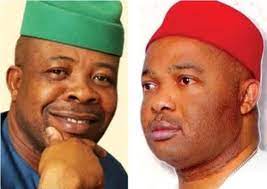
I have gone through the judgment of the Supreme Court (SC) in the Ihedioha case. My humble view is that if the learned Hon. Justice Kekere-Ekun should go through the judgment a second time, she would not be proud of herself. I say so with the greatest respect and out of the very high esteem in which I hold her. She wrote a judgment declaring that Uzodinma obtained the highest votes in the election but did not state the number of those votes. That is like INEC declaring an election result without stating the scores of the candidates. In my view, the error is sufficient to invalidate the judgment.
It is true that Uzodinma had presented a figure to the court as what his scores should have been if the excluded results were included. It is also true that the court agreed with him that it was wrong to have excluded those results. But the court made the fundamental error of failing to declare at the end of the judgment the total figures for each candidate in the election after the adjustment of the inclusion of the hitherto excluded result sheets.
The fundamental effect of the error lies in the fact that the total scores of Uzodinma are not the only relevant figures to be declared in order to have a valid declaration of results. Other figures that need to be declared according to the Electoral Act include the total votes recorded by each of the other candidates, the number of accredited voters in the election, the number of valid votes, the number of invalid votes and the number of spoilt or damaged ballots. All of these go to show the credibility of the results declared to an impartial and reasonable observer.
Equally fundamental is the omission of the Court to take into reckoning and declare the parameter of spread of the votes. The Constitution requires that to win the election, the Governorship candidate must obtain not only the total votes cast but also a quarter of the votes cast in 2/3 of the LGs in the State. It may be that Uzodinma also qualified on this score but it cannot be assumed. It must be declared to be so. Imagine INEC declaring a Governorship candidate to have won the election without declaring the number of votes that he secured in each LG and declaring also that taking that into account, he has satisfied the requirement of spread. Uzodinma totally forgot about spread in his case.
The omission of spread also invalidates the judgment of the SC. We are not supposed to engage in “fill in the blank spaces” for the court.
A fallout of the failure of the SC to declare the complete results having adjusted the results declared by INEC to include not just votes excluded but also entire Form EC8A result sheets for 388 polling units is the argument of the PDP that with the total votes that Uzodinma claims to have obtained from the excluded votes, it means that total votes cast at the election for all the candidates exceeded total voters accredited to cast those votes by over 100 000 votes. That makes the results which the SC has given its blessing to absolutely absurd. If this is established, it will again be sufficient by itself to invalidate the judgment of the SC.
The sum of the analysis is that no one by reading through the judgment of the SC can have a record of the results of the election. If the judgment stands, we shall have a Governor made by the SC without results to back up his election. That spells invalidity for the judgment.
I have been describing the judgment as INVALID. Particular note should be taken of that word. I entirely agree that it is an insult upon any court of law, most especially the SC, for any party against whom a judgment has been given to approach the court with a request that it reviews and sets aside the judgement on the ground that it is wrong in law or fact. That should be almost unthinkable for any lawyer. However, it must be said firmly with all decorum that the exercise of judicial power by any court, including the SC, can be invalid just as the exercise of any other power granted by law by any other authority. Just as the SC can declare an exercise of power by the President invalid, null and void of any effect, so also can it declare its own exercise of power to adjudicate on any matter invalid, null and void because the SC is a legal authority just like the President.
When the issue is the validity of a judgment of the SC, there is no question of whether it is right or wrong. It may be the best judgment ever written. It may be the wisest judgment of Daniel. But if it is invalid according to rules set by the SC itself, it is invalid. In the Osun Governorship Election petition appeal, the SC declared the judgment of the Tribunal NOT WRONG but invalid, null and void for the reason that one of the Tribunal members was absent from the sitting of the Tribunal on one of the days when evidence was taken. It did not matter that that judgment might have been an embodiment of the wisdom of Solomon.
A plea that the SC has engaged in an invalid adjudication does not therefore question the wisdom of the court or the correctness of its verdict. It does not question the power of the court to adjudicate but rather the manner in which the court has exercised that power of which it is but a trustee with the people of Nigeria being the beneficial owners. It is a most sacred plea to which historically superior courts in all respectable jurisdictions of the world have accorded the most sublime of attention because its object is not to embarrass the court but rather to strengthen the confidence of the people in its adjudication. If the Supreme Court would not shy away from declaring its own adjudication an invalid exercise of power, then who is that authority within the land that would consider himself beyond the review power of the court? That is the reasoning.
What then can render a judgment of the SC an invalid exercise of the power to adjudicate? The answer, as with many things, can be simply stated but its application can be very difficult and delicate. Anything that could make a reasonable man justifiably think that the court has not engaged in a fair process of adjudication or that could make him look upon its judgment with scorn justifiably is sufficient, as a matter of law, to invalidate the judgment of the court. The issue, it should be noted, is not whether the judgment is fair but rather whether the process of reaching it has been fair. No party may question the judgment of the SC on the ground that it is unfair to him because the judgment is what it is – a judgment, the lot of that party. But a party may complain that the process of reaching the judgment has been unfair and that the unfairness has made the judgment an invalid exercise.
The process of reaching a judgment would be unfair if a party’s side of the case was not heard before the judgment was reached. Hearing in this instance has a very broad meaning that goes beyond the party presenting his case in court. It extends to according the case of the party every necessary attention in everyrespect that is relevant to reaching a just verdict. In this case, with the court not having stated the scores of the parties and necessary analysis of the results before declaring one party a winner as against the declaration of the election umpire, it is inherent in the verdict that the court failed to accord necessary attention to the case of Ihedioha as regards those fundamental issues on which the court was silent. These are issues on which the court must make a finding before it reaches a verdict. Not having made those findings renders the verdict specious and therefore invalid, irrespective of its assumed correctness.
A court would be deemed to have engaged in an unfair process of adjudication when it makes findings that are so inconsistent or unreasonable that they show that the court has not accorded the side that lost sufficient or fair hearing. If, for instance, on a question as to whether a party who was granted leave of absence for 28 days overstayed his leave, a finding by the court that it was proved that he did so because it was proved that he stayed for the whole of the month of February and reported for duty on the 1st day of March on the conclusion that there are 31 days in February, would be an unfair process of adjudication and sufficient to invalidate the verdict. Note, however, that if the issue was the number of days in February and the court gave 31 as an answer, the verdict would be beyond review on the ground that it is obviously wrong. The SC would wait for an opportunity in another case to correct the error.
In this case, the difference of over100 000 in the total number of votes cast at the election and the total number of people accredited to cast the votes, if established would invite the just contempt of a reasonable impartial observer on the judgment and the process of reaching it. It would rob the judgment of the sacred quality of justice.
It is also said that lack of jurisdiction would render a judgment of any court null and void. It is only axiomatic that if the court lacks the power and authority to embark on the adjudication or make the orders that it made, the judgment would lack the authority of law and would be null and void. But again, jurisdiction is used here on a much wider sense. It includes unfair procedure and unfair exercise of power.
Thus, almost anything that qualifies as unfair process of adjudication would also qualify as lack of jurisdiction. Not court has the jurisdiction to act unfairly. Thus, the SC lacks the jurisdiction to declare a party a winner of a Governorship election contrary to the declaration of INEC and by addition of results sheets not taken into consideration by INEC WITHOUT declaring the whole of the results in the manner stipulated by law to show that all the parameters of the results declared make them credible as such and that the candidate declared winner satisfied the required spread of votes.
In sum, both procedural unfairness and lack of jurisdiction are euphemisms for saying to the court – milords, you messed up big time. It is coded language which the bench and the bar understand very well. If you can picture a judgment as a report that you assigned someone to do and if looking at the report you can immediately retort, “what is this that you have done, do you call this a report?’ Then, the judgment is an invalid exercise of judicial power.






